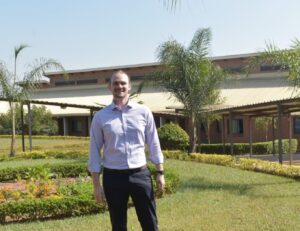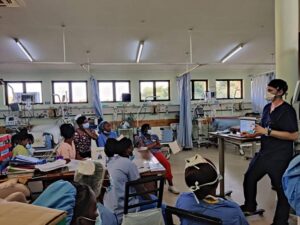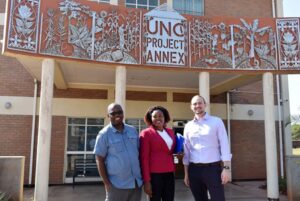
May has been a whirlwind of a month! Between finishing up final projects, work commitments, and packing my bags it was a bit of a stressful start. Nonetheless, I caught my flight out of Raleigh to begin my 13 weeks abroad. And since submitting my last assignment of the semester during a layover at the Addis Ababa, Ethiopia airport, I have been able to primarily focus on my practicum!
I am completing it with UNC Project-Malawi for 8 weeks in Lilongwe, Malawi. I will then travel to Nairobi, Kenya for 5 weeks as a Peacock Fellow with Carolina for Kibera (CFK) Africa in Kibera – one of the world’s largest informal settlements with population estimates of 250,000 to 1 million people, living in less than 1 square mile.
Even before our classes began last August, I have been looking forward to the practicum as an opportunity to apply skills from the classroom in the “real-world” and help me figure out my initial career goals. Since I am a Registered Nurse hoping to maintain clinical skills but also with interest in bigger-picture health systems strengthening, it is important for me to spend time in different settings around the world to determine how I can be effective in the huge field of “global health”.
Thankfully, the staff at UNC Project-Malawi and CFK have all been welcoming and encouraged me to identify areas of interest to explore. This is amazing but also difficult since I have so many interests. For my time in Malawi, I decided to focus on a few areas: clinical care, community health, and assisting on qualitative data analysis. I also am hoping to further strengthen a growing relationship between the UNC School of Nursing, UNC Project-Malawi, and other partners here such as the Kamuzu College of Nursing.
The data analysis that I am supporting is in relation to perceptions of cancer care in Malawi. I’ll specifically focus on the perspective and needs identified by healthcare workers in oncology. Therefore, some of my “clinical” time is spent observing and assisting in the newly constructed cancer center. My other primary focus is in the Intensive Care Unit (ICU) supporting staff and leading Continuing Professional Development (CPD) sessions.

To gain further context for data analysis and understand more of Malawi’s health system, I expressed interest in community health activities. Thus far, I went with UNC Project-Malawi’s community outreach team to deliver nutritional support to Dzama Orphan Care and School and participated in a course at Kamuzu College of Nursing focused on gender equality and gender mainstreaming.
We discussed representation of men and women, for example in government. Some of the Malawian students expressed that they thought of the U.S. as a leader in gender equality, so were surprised to hear that women only hold 27% of seats in Congress and approximately 31% at the state/local level. Conversely, Malawi has elected a woman to be president, Joyce Banda in 2012, while the U.S. has not. We all agreed there is much more work to do toward equity around the world.
Similar agreements have been reached in the clinical setting when I have been looked to as an expert since I trained in the U.S. I share my perspective but am quick to remind colleagues that I am only just beginning to learn best practices for provision of care here in Malawi. From the CPD sessions, I have recognized that knowledge gained in nursing education here is quite similar to the U.S., there just aren’t always as many resources available in the hospital, and there are systemic influences across the continuum of health, illness, injury, and care delivery, which negatively affect outcomes.
These systemic factors are what I’m most interested to learn about since they must be addressed if health outcomes are going to improve. It is honestly quite overwhelming to think about them though.
I’ve been reflecting on when I studied to become, and worked as, a nurse – I personally found it to be straightforward. Generally, we knew what to do in the hospital. And I felt that I was relatively good at it. Working in global health seems so different to me, because I often have no idea what needs to be done on a systems-level. Things are overwhelmingly complex and it seems there is not often a straightforward solution.
It’s so easy for us to criticize a system and identify issues and needs, especially from a classroom, or coming into a setting with lower-resources than we’re accustomed to working with. It seems much harder, though, to identify and implement effective and appropriate solutions.
In feeling overwhelmed, I have been reflecting on a quote from the late Dr. Paul Farmer (co-founder of Partners in Health) about what kept him motivated to work in this field. He said, “Doing hard things with friends.”

Although all careers have challenges, I am lucky that in nursing I personally found a handful of “easy things.” All I can see right now entering global health is a whole lot of “hard things” and I have been caught up these last few weeks by focusing on the overwhelming challenges we face. Perhaps I need to begin focusing more on the other half of Dr. Farmer’s quote though; doing these hard things with friends. Because this is indeed when we can make progress, and I am inspired to do so with the amazing people I have met working here in Lilongwe. I hope that with these new friends, I can continue to learn, take on hard things a little at a time, and move together toward a more equitable world.
– Mitch
